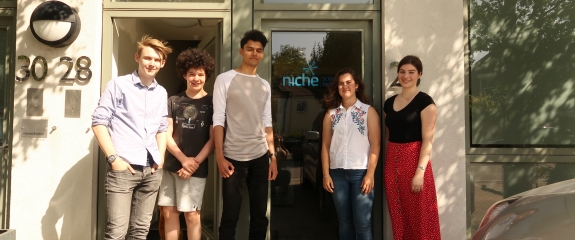Infinite Monkey Cage

We all have a responsibility to encourage young people to study science, lighting the fire of their enthusiasm and wonder. They are our future. Running during the summer, our Summer Internships offer high calibre students from different backgrounds the opportunity to experience work and life at Niche, and gain a valuable insight into the inner workings of the pharmaceutical industry. Operating in a contract research organisation environment, where 75% of all pharmaceutical research is conducted, our interns work alongside experienced professionals on live and interesting projects.
This year we had more applicants than usual. Rather than disappoint candidates, we decided to create an opportunity where a group of young people could come together to solve a unique problem currently facing the pharmaceutical industry – the challenge of reducing the time it takes to complete the research programmes required to register new drugs. We called the experience ‘The Infinite Monkey Cage Challenge’ – after the original proposition by Aristotle, not the Radio 4 series.
The infinite monkey theorem proposes that if a monkey hitting keys at random on a keyboard for an infinite amount of time it will end up with any given text (eventually), such as the complete works of William Shakespeare may appear (one day). The task we have set our interns may seem impossible – but work in science long enough and you come to observe that the number of unlikely things that can happen is so large that you can be assured that unlikely things will happen. Or, in the words of Terry Pratchett, “Scientists have calculated that the chances of something so patently absurd actually existing are millions to one. But magicians have calculated that million-to-one chances crop up nine times out of ten”.
We believe that young people yet retain the ability to combine magic and science. We are interested in harnessing those abilities. The challenge our interns have been set is a real one and several research groups are already attempting to address it. This means that our ‘Cagers’ will also be working on a business challenge – how to get ahead of our opposition.
Obviously there is no right or wrong answer to the challenge. We would describe success as the team coming together as a group, achieving a consensus and presenting their findings professionally to the Niche team on its conclusion. The Cagers haven’t been given too much information on their challenge as we didn’t want to bias their understanding with our out-dated thinking.
We are hoping that the experience will help them grow as scientists. It is also our intention that they will be able to add the outputs of their work (project report, presentation, etc.) to their portfolios, and that they will be able to use the learning and any materials they create when they face up to their next challenge or opportunity.
Join us in wishing them luck on the challenge ahead of them.


